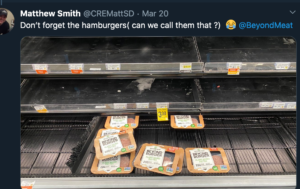Who Moved the Cheese?

How many times have we heard lately that the world will never be the same again? Time will tell, and important to see how habits have changed in the relatively short amount of time that has elapsed since the onset of the Wuhan virus panic.
People are working, eating – and cooking – more at home. Many restaurants have shuttered – some, at least, only temporarily – and we suppose that there’s just so much McDonald’s and pizza one can consume on a daily basis. Don’t have mad skills in the kitchen? As we mentioned last week, Blue Apron’s stock suddenly soared. We’ve also noticed more FreshDirect trucks on the street, and no surprise that Instacart is hiring 300,000 grocery shoppers (although, workers protest at Instacart, Amazon and Whole Foods for health protections and hazard pay, reports the Washington Post). People are presumably cooking and note to self: there will always be businesses that do well, as conditions and circumstances change and also note, re the WaPost piece: “Grocery store, delivery and warehouse workers have unprecedented leverage to demand better working conditions during the coronavirus pandemic because their labor has become essential for millions of Americans.”
How long have we been hearing about Amazon’s abuses of its employees (Reminder: Amazon Treats Its Employees Like Shit)?
People are presumably cooking and note to self: there will always be businesses that do well, as conditions and circumstances change.
One of the big foci of investors pre-Wuhan was health and wellness. Plant-based meats, like Beyond Meat and Impossible Foods, raised huge funding rounds – Beyond Meat is now publicly held, and the stock price is down. Meanwhile, Impossible Foods Slashes Prices By 15% On Average, supposedly to be more competitive, but as we shopped during the current crisis, we didn’t exactly see the products flying off the shelves.
Everything’s great – until someone moves the cheese. .
Are items that are sustainable or ethically sourced or arguably Frankenfood really a priority? Are people always willing to pay a premium?
Don’t forget the hamburgers (can we call them that?) @BeyondMeat (photo on the SOS website)
Someone mentioned in the comments section in an article on current food buying habits, “I’ve noticed in Henderson, NV that no one is buying the organic crap. No one wants to spend $4.50 for 8oz of soup.”
For your amusement, Here’s The Food People Refuse To Buy Even During A Pandemic. Chocolate hummus? Really Trader Joe’s? At least presently, not so much.
“Hope those idiots that have bought and stockpiled all the toilet paper have also bought all the contraceptives too, don’t need them to reproduce after this episode,” was another comment in an article we’d seen.
Noted CNBC “In addition to medical supplies, such as cold medicine, thermometers and tissues, and items for the pantry, such as canned goods and bottled water, people have begun shelling out money for entertainment. Board games, puzzles and video games have become popular items.
According to Kit Yarrow, a consumer psychologist, people are currently purchasing items based on three needs: to protect, to entertain and to connect.”
People will no doubt also be using technologies in new ways. Example: Brooklyn Man Beats Social Distancing By Using Drone to Ask A Woman Out. True story and with all due respect to all of the dating apps out there, it was the girl next door who literally caught his eye.
We mention all of this as, although we’re certain that medications will be developed for Covid-19, note to self: this has been an incredibly deadly flu season. The flu in America, so far this season, according to the CDC, has caused up to 54 million illnesses, 730,000 hospitalizations and 24,000-62,000 deaths – and the season isn’t over yet. According to WebMD, in 2018, influenza took the lives of 80,000 Americans.
May be a need out there – and elsewhere – for Flu/Pandemic Survival Kits. Or, considering that New York Internet Speeds Have Plunged As Locked-Down Americans Clog Networks, doesn’t hurt to think analog, too. For more inspiration, Venture Beat did a piece on Our post-coronavirus world: How tech is influencing which new habits will stick.
Habits are changing and time will tell how this will all shake out. In the meantime, good idea to look around, see where the white spaces are in your new world order and get your plandemic together as we go onward and forward.